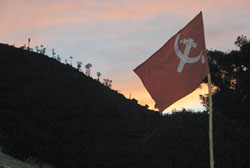 In the week after the Maoists refused to extend their ceasefire, the rebels have stepped up their bombing campaign targeting government buildings.
In the week after the Maoists refused to extend their ceasefire, the rebels have stepped up their bombing campaign targeting government buildings.
The rebels said they would take the war from the villages to the cities and that is what they are doing. But all they are destroying are district education offices.
The army's offensive into Rukum two weeks ago now appears to have been a deliberate attempt to provoke the rebels not to extend the ceasefire. Indeed, as soon as the announcement on the ceasfire was made on 2 January the rangers returned to base.
Meanwhile, King Gyanendra is touring eastern Nepal again to make televised forays into market towns to prove to critics he has overwhelming popular support. The three-week trip also seems to be designed to send a message to the international community, political parties and Maoists that he couldn't be bothered whether the ceasefire was extended or not.
For people across Nepal, however, there is overwhelming fear that the country is teetering on the edge of full-scale war. The king's army and the rebel forces are gearing up for a showdown soon to coincide with municipal elections on 8 February and the tenth anniversary of the war on 13 February. The Home Ministry's announcement on Wednesday asking people to be vigilant about 'suspicious people' and night curfews along some highways has raised the level of nervousness.
Reports from central and eastern Nepal say there is heavy movement of Maoist fighters through the jungle trails. The rebels appear to be moving their eastern and western divisions to districts adjoining the Valley.
The political parties, deeply disappointed by the breakdown of the ceasefire, have said it won't affect their 12-point agreement with the Maoists. But they admit they are walking on a knife's edge as they prepare huge rallies in the run up to municipal polls that they are boycotting. The state is preparing for a harsh crackdown against the parties, while the Maoists could use the melee to stage urban counterattacks on security forces.
The UN and India have expressed concern about the end of the ceasefire. On Wednesday, the US called it \'unhelpful\' reiterating its desire that the king and the parties find a way to restore peace and democracy.
Arbour's appeal
The United Nations High Commissioner for Human Rights on Wednesday called for full respect of international humanitarian and human rights law in Nepal's armed conflict, following the end of the ceasefire by the Maoists.
High Commissioner Louise Arbour said: "It is a tragedy for the people of Nepal that a full-scale armed conflict may now resume. But there need not and must not be the same gross violations of international humanitarian law and human rights standards that have been perpetrated during previous phases of the conflict."
She added: "My office in Nepal will be closely monitoring the conduct of both parties in the period ahead."
The statement reminds the army of its obligations and calls on the Maoists to publicly declare their acceptance of international law and to explain these to their cadre. Arbour reminded the Maoists that international laws prohibit the murder or violence against people taking no active part in hostilities, including government officials, families of security forces personnel and persons alleged to be informers.
Despite these clear legal obligations both parties have committed serious violations of international humanitarian law in the past, UNHCHR said.


